New
With the Electrical Conductivity (SBA)Electrical conductivity is a physical property indicating a material's ability to allow the transport of an electric charge.SBA 458 Nemesis® (figure 1), both the Seebeck coefficient and the Electrical Conductivity (SBA)Electrical conductivity is a physical property indicating a material's ability to allow the transport of an electric charge.electrical conductivity can be determined in the range from room temperature to 800°C using various sample geometries and dimensions. By means of the development of a high-temperature sample carrier system for the Electrical Conductivity (SBA)Electrical conductivity is a physical property indicating a material's ability to allow the transport of an electric charge.SBA 458, measurements can now also be carried out in the temperature range from room temperature to 1100°C.
By means of the development of a high-temperature sample carrier system for the Electrical Conductivity (SBA)Electrical conductivity is a physical property indicating a material's ability to allow the transport of an electric charge.SBA 458, measurements can now also be carried out in the temperature range from room temperature to 1100°C.
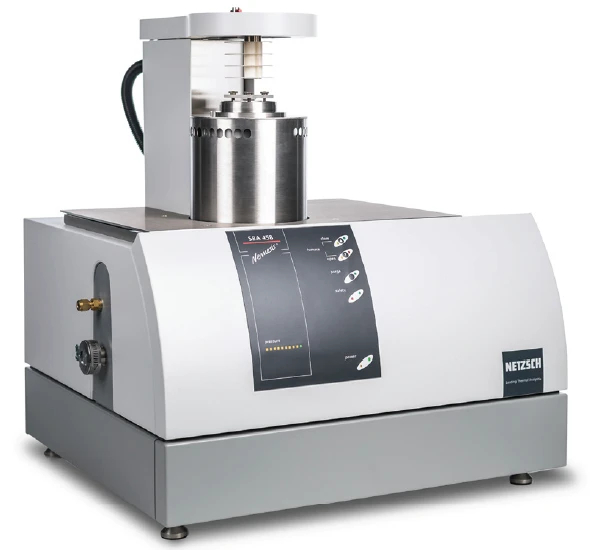
Easy Realization
The new high-temperature sample carrier system is equipped with ceramic components and specially designed micro heaters allowing for measurements up to 1100°C. Furthermore, sensitive parts in the sample carrier system are also protected.
The high-temperature sample carrier system can be used – without additional mechanical or electrical adjustment – in the basic unit of the Electrical Conductivity (SBA)Electrical conductivity is a physical property indicating a material's ability to allow the transport of an electric charge.SBA 458 (plug and play). The software automatically recognizes the built-in sample carrier system so that the operator can start with the measurement directly.
Insertion of the sample and start of the measurement is as easy as with the 800°C sample carrier system.
Measurements
In this application note, the high measuring accuracy of the Electrical Conductivity (SBA)Electrical conductivity is a physical property indicating a material's ability to allow the transport of an electric charge.SBA 458 with the high-temperature sample carrier system will be demonstrated with the example of various measurements. Since there are no stable and certified thermoelectric materials in the temperature range to 1100°C, the measurements shown here with the new high-temperature sample carrier system are on metals up to 1100°C as well as one additional measurement on certified lead telluride to 350°C.
Figures 2 and 3 show the measurements of the Seebeck coefficient and Electrical Conductivity (SBA)Electrical conductivity is a physical property indicating a material's ability to allow the transport of an electric charge.electrical conductivity of nickel and palladium to 1100°C. The deviations from the corresponding literature values are less than 5% for both the Seebeck coefficient and Electrical Conductivity (SBA)Electrical conductivity is a physical property indicating a material's ability to allow the transport of an electric charge.electrical conductivity.
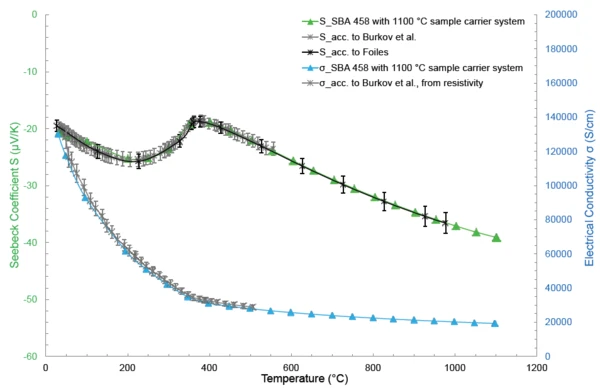
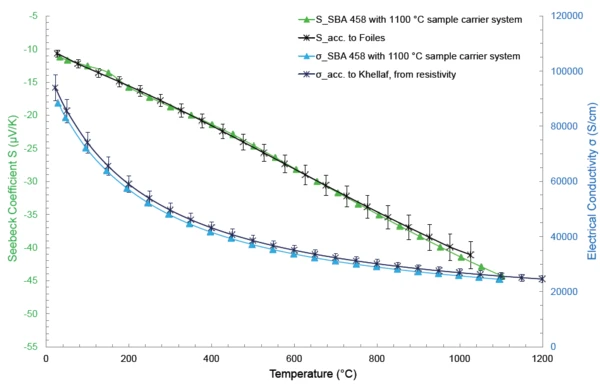
The lead telluride certified for the Seebeck coefficient was measured at a deviation of less than 7% (figure 4).
Another example demonstrating the high accuracy of the Electrical Conductivity (SBA)Electrical conductivity is a physical property indicating a material's ability to allow the transport of an electric charge.SBA 458 in the range to 1100°C is shown with the measurement on pure iron.
Pure iron has a low Seebeck coefficient, which complicates the process of determining that value. Despite this, the measurement results of both the Seebeck coefficient and the Electrical Conductivity (SBA)Electrical conductivity is a physical property indicating a material's ability to allow the transport of an electric charge.electrical conductivity exhibit high measuring accuracy (see figure 5).
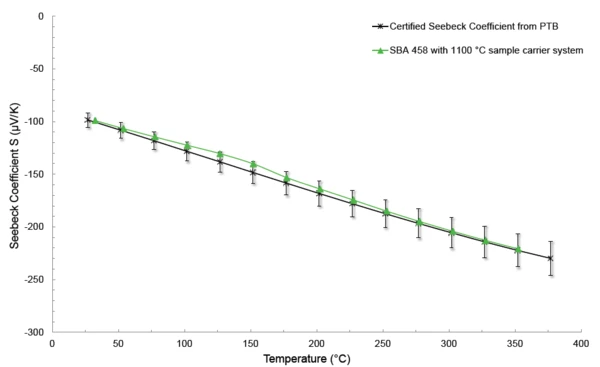
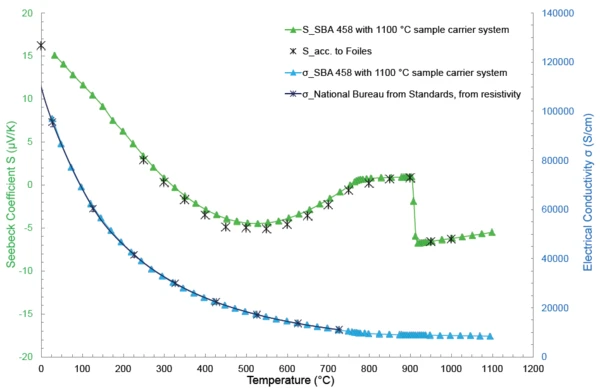
At room temperature, pure iron exists in the α modification (body-centered, cubic crystal structure, or BCC) and is transformed at 911°C into the γ modification (facecentered cubic crystal structure, or FCC). These transitions, as well as the Curie point, can be detected by means of thermal analysis (dilatometer, DSC) and now also with the SBA 458 (see figure 6).
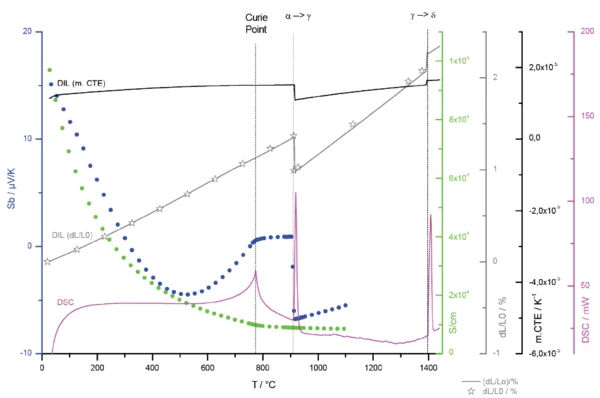
Specifications
As demonstrated with these measurements, the SBA 458 – also with the new 1100°C sample carrier system – is capable of high-accuracy measurement of both the Seebeck coefficient and the Electrical Conductivity (SBA)Electrical conductivity is a physical property indicating a material's ability to allow the transport of an electric charge.electrical conductivity in the range to 1100°C.
For support of the 1100°C sample carrier system in the SBA 458, software version 2.0.7.0 is required.
The following technical data apply:
Temperature range:
- Room temperature to 800°C
- Room temperature to 1100°C
Sample dimensions:
- :10 x 10 mm
- Ø :12.7 ... 25.4 mm
- : Length x Width:12.7 … 25.4 x 2,0 … 25.4 mm
- Thickness: 100 nm to 3 mm, depending on the thermophysical properties
Measuring range of the Seebeck coefficient:
- 10 to 2000 μV/K
- Accuracy*: ± 7%
- Repeatability: ± 3%
Measuring range of the Electrical Conductivity (SBA)Electrical conductivity is a physical property indicating a material's ability to allow the transport of an electric charge.electrical conductivity:
- 0.05 to 150000 S/cm
- Accuracy*: ± 5%
- Repeatability*: ± 3%
* for most materials